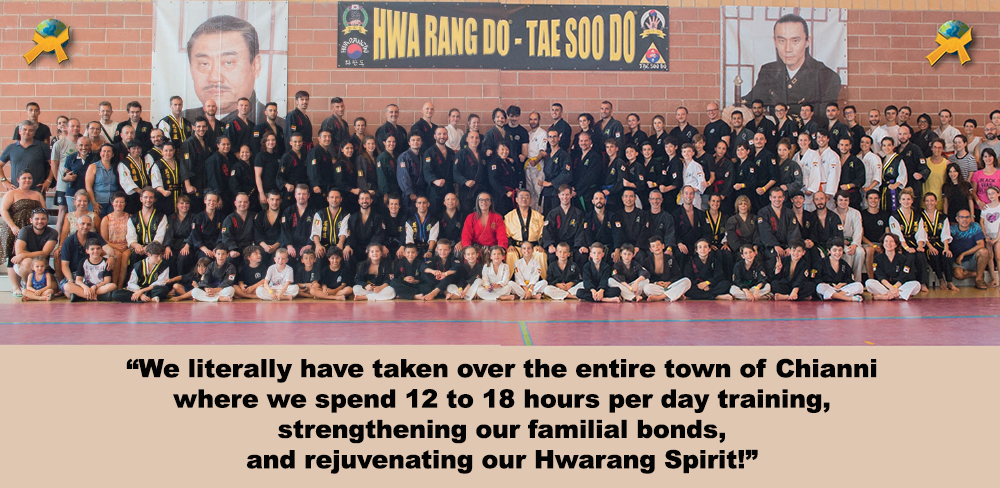The World Hwa Rang Do® Association Annual Event 2019 (Part 1)
Published in Budo International October 2019 Issue
By: Marco Mattiucci
Photos By: Claire Davey
This year the World Hwa Rang Do® Association Annual Events, which includes Open Summer Seminars (open to the general public), Black Sash Conference (for only Hwa Rang Do Black Sashes) and the World Championships 2019, took place in the beautiful Tuscan countryside of Chianni, Italy. It took place from June 29 through July 8 with the World Championships taking place on June 30 & July 1. It is nine days of full-emersion into the world of Hwa Rang Do, starting each day as early as dawn with morning meditation, internal energy (Nae Gong) training, and intensive seminars on various subjects of the Art throughout the day, then the Hwa Rang Do (HRD) Black Sashes and the HRD Color Sashes as well as the Tae Soo Do (TSD) students divide up: The Black Sashes train under the direct supervision of the Founder, Supreme Grandmaster Dr. Joo Bang Lee and the rest with his son, Grandmaster Taejoon Lee, practicing the core curriculum of HRD which encompasses over 4,000 techniques. The training usually ends around 19:00, and then the day ends with a group dinner, enjoying the wonderful Italian cuisine with deep discussion late into the night. “We didn’t come here to sleep,” is a popular phrase expressed by all. We literally have taken over the entire town of Chianni where we spend 12 to 18 hours per day training, strengthening our familial bonds, and rejuvenating our Hwarang Spirit!
It was another incredible experience with students, parents, instructors, from all over the world to gather once a year to be taught and mentored directly from the Founder, Supreme Grandmaster Dr. Joo Bang Lee and his son Grandmaster Taejoon Lee. It is also a family reunion where the students can reconnect with old students and create new bonds with new students.
The event started with an Open Seminar on Hwarang Kumsul (Sword Techniques). Grandmaster Taejoon Lee (Kuksanim) led over a 100 students on the use of the mokkum (wooden sword) as a way of practicing true sword fighting of the live blade. It was a very detailed instruction on the various cuts, blocks, and counters with fun yet serious drills to develop grater accuracy, focus and fluidity. Kuksanim constantly reminded everyone of the importance of training as though the wooden swords were live blades and should always be treated with care and respect. “There can be no mistakes, no retry, no redo; that one mistake can mean death. One must think clearly before taking action, as wrong action cannot be undone. With one cut, it’s either life or death. That is the way of the sword,” Grandmaster Lee emphasized that with this idea is the way in which we should live our lives.
“Click”, “clack”, the whole gym reverberated with the clashing of wooden swords with some breaking from high impact. After two hours of sword drills on attack, defenses, and counter-attacks, Grandmaster Lee ended the session with the theme for this year. Each year, there is a deeper philosophical point, which Kuksanim introduces at the beginning for the students to reflect and meditate on throughout the entire week. “What is the true value of your training?” Kuksanim asked.
“I want you to think about this and at the end of the week, during our final discussion I will ask you this question once again. However, I want you to contemplate on this idea. During the mid-twentieth century, a neuroscientist Dr. Benjamin Libet performed one of the most important experiments on human consciousness. Basically, in this experiment, with electrodes placed on various parts of the scalp to monitor brain activities, he asked the participants of the experiment to perform some simple motor activities such as pressing a button. He found that there a time delay of 50 milliseconds from the time the electrodes detected a spike to the time the action was performed. More importantly, he then asked them to think of taking the action and then stop themselves from performing the act. When the participant did as instructed, the electrodes detected no brain activity at all. There are profound implications here and this is what I want you to think about before you determine what true ‘value’ is. When Dr. Libet was asked, ‘Do you believe in Freewill?’ He answered, ‘I don’t know about Freewill, but I know there’s Freewon’t!” With this he ended the session, giving everyone much to think about.
After lunch, we once again gathered to learn from Grandmaster Lee on proper punching techniques for the application of our sparring, Yongtoogi. He started with how to properly hold a fist, which most people, even professional fighters often hold improperly, resulting in injuries to the hand and/or the wrist. He emphasized the thumb only covering over the index finger and not all the way across the middle finger, which deforms the shape of the hand as well as keeping the top of the hand flat with the wrist straight, striking with the large two knuckles only. Then, he proceeded to teach proper stepping, which is crucial for quick entry and exit. The short step of step/slide with a jab extended with the lead leg and the reverse or cross with the rear leg firmly planted on the ground, pivoting on the ball of the foot for maximum power and penetration was thoroughly reviewed. With the fundamentals covered, he moved on to other striking combinations, with ducking, feinting, rolling, and paring, which then the students were paired up to practice on each other. Some of the main points he stressed were the understanding of how to effectively control and maintain proper distance and the center line (or the line of fire), and the importance of keeping your eyes on the target at all times, which applies to all aspects of combat. He concluded the session applying these principles to daily life. “In life, whether it is a task or a relationship it is a matter of distance, of commitment. Surely, just as in fighting if you can keep away and be apart far enough, you will avoid being struck, being hurt, being vulnerable. However, unless you commit fully, you cannot win, you cannot succeed, and in relationships you cannot know true love. You must risk injury, harm, pain, suffering and commit whole-heartedly and after many failures and trials with God’s grace you will know victory, you will experience love. You do not win by defending, you do not succeed without trying, and you do not fall (it is not fall, it is a choice) in love without giving. And, always keep your focus on what is of most value, and if it is not God, then it is an idol, and all manmade idols are false and temporary.”
On the last part of Grandmaster Taejoon Lee’s seminars for the day, he instructed on some effective takedowns for Gotoogi (submission grappling). He showed some sweeps and leg hooks and then how to use them to setup a secondary attack. He ended with some sacrifice throws, utilizing the other opponent’s energy and momentum. The takedowns he performed looked so fluid and effortless. And, he commented, “This is the nature of Yusul (in Korean), Jiujitsu (in Japanese), the ‘Soft Way’. It is not fighting power with power, but as water corrodes even the strongest steel, so can the largest be taken down by the smallest with fluidity and grace.” And as always he applied these principles to life, “Know that when faced with a difficult problem, there is always a way. Never give up, always relent as water always finds a path, as long as you do not give up you will find your way. The greater the challenge, harder the problem, the greater your endurance will be. And, it is not who starts a race that is of value, but who finishes.”
The next session was a highly anticipated seminar on joint manipulation by Dojoonim with the most participants. Hwa Rang Do is very well versed in the art of joint-manipulation from stand-up for arrest and control, utilizing it as a takedown, and then submitting and finishing on the ground.
The key elements to effective joint manipulation are the understanding of angels and leverage. He started the session on finger manipulation, then to the elbow, and shoulder. He had some senior students demonstrate the techniques and then broke it down like a true master to it’s most finely detailed components, explaining the mistakes and how to avoid them. Dojoonim stressed the importance of not using brute force, but applying proper technique, “Even a monkey can be taught to kick and punch and most animals are far more superior in physical strength than human beings in proportion.
Our greatest strength is our mind. Do not try to overpower and if you have to force it, then it is wrong. It is all technique.” As he brings his opponent to his knees with his pinky, “See, doesn’t matter the size, only your mind is important. What you’re thinking, what you’re feeling, and what you’re believing. If you don’t know then you cannot do; if you are afraid, then you cannot do; if you don’t believe, then it is impossible.”
Dojoonim’s session ended the first day of the Open Seminars. Everyone’s excitement and enthusiasm created such high energy, that the intensive day of almost 8 hrs seemed to have just flown by. They were all hungry for more and many stayed after, training to prepare for the competition the very next day. We concluded the evening with a formal Awards Banquet to recognize the exceptional students, instructors, and masters of the year. The Italian dinner also lived up to its reputation with an amazing five-course meal – antipasto starter, assortment of delicious pastas, a big juicy steak, gelato and tiramisu for dessert. It was a perfect day, at the perfect setting, with our most beloved Hwa Rang Do family.
Continued on Part 2…
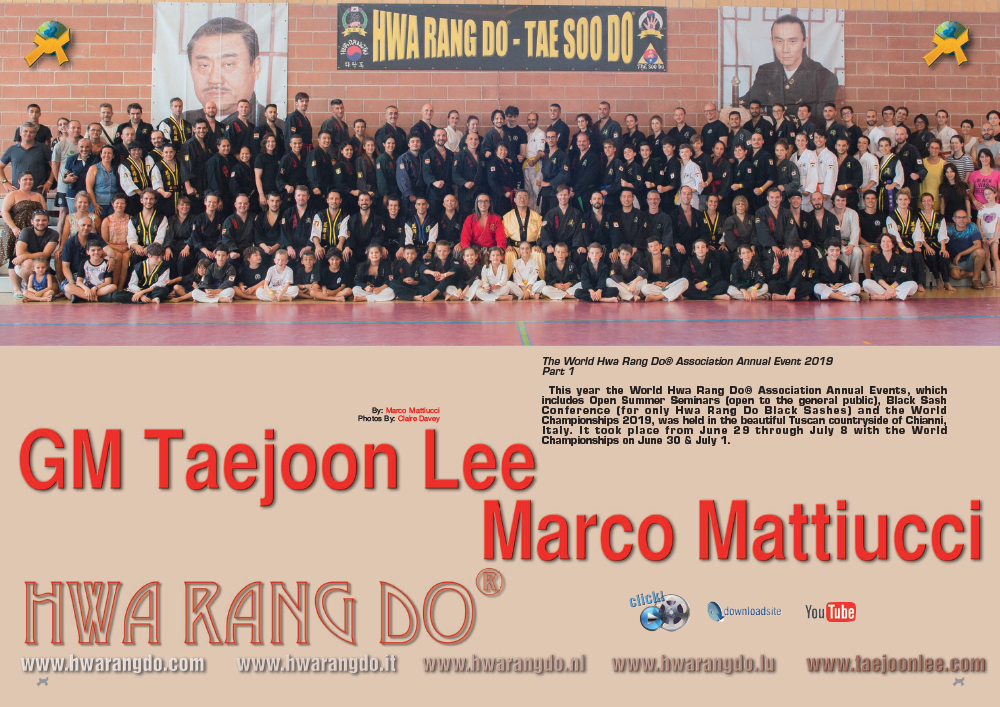
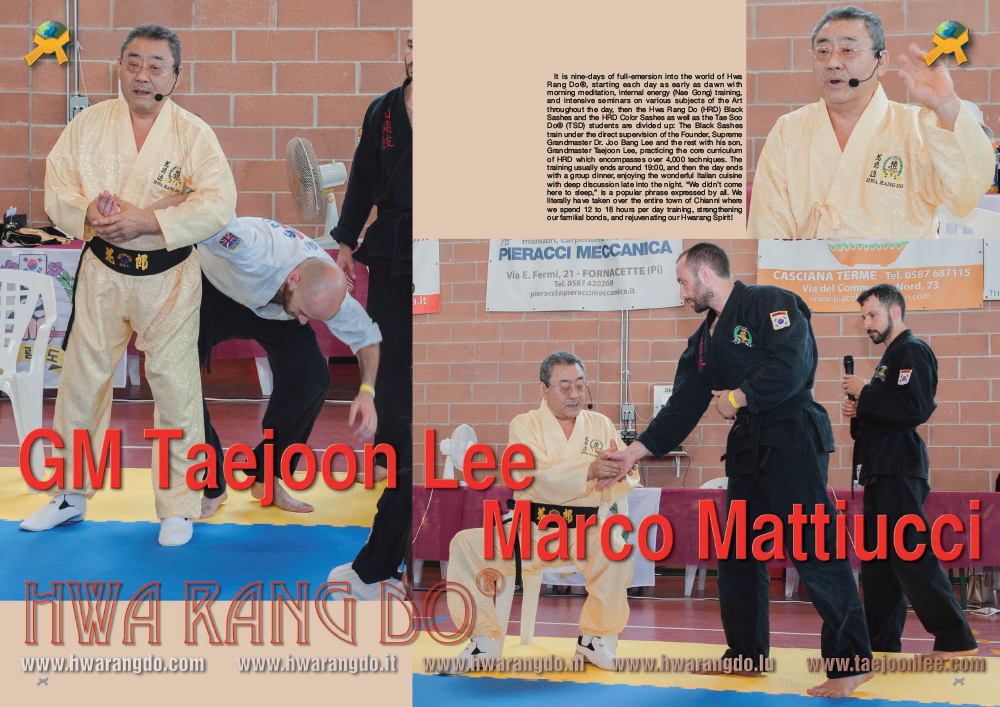
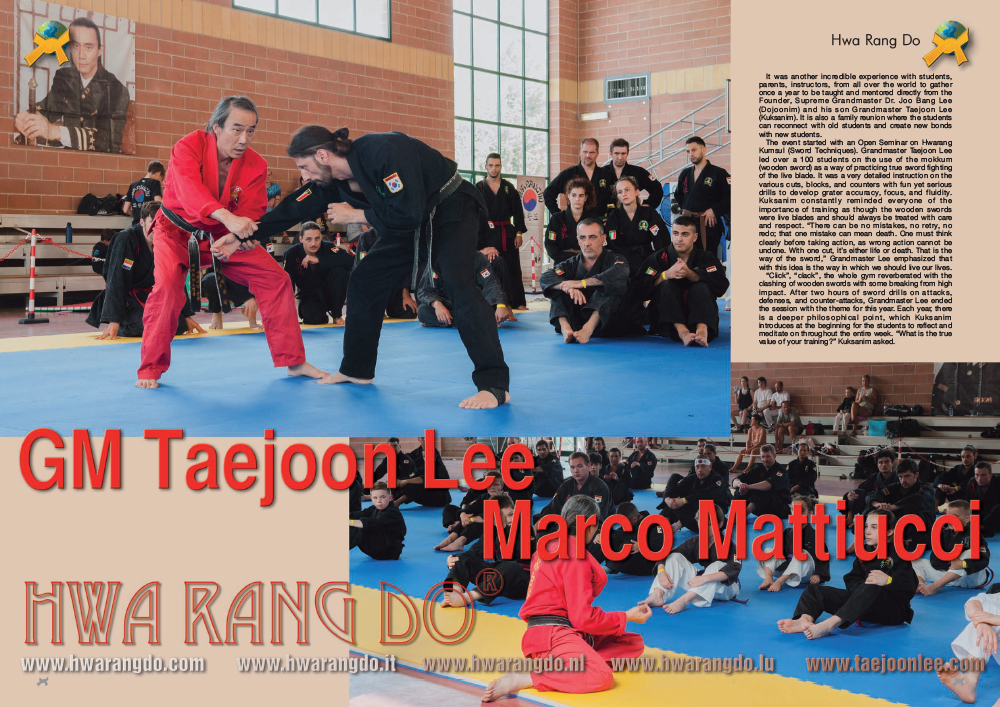
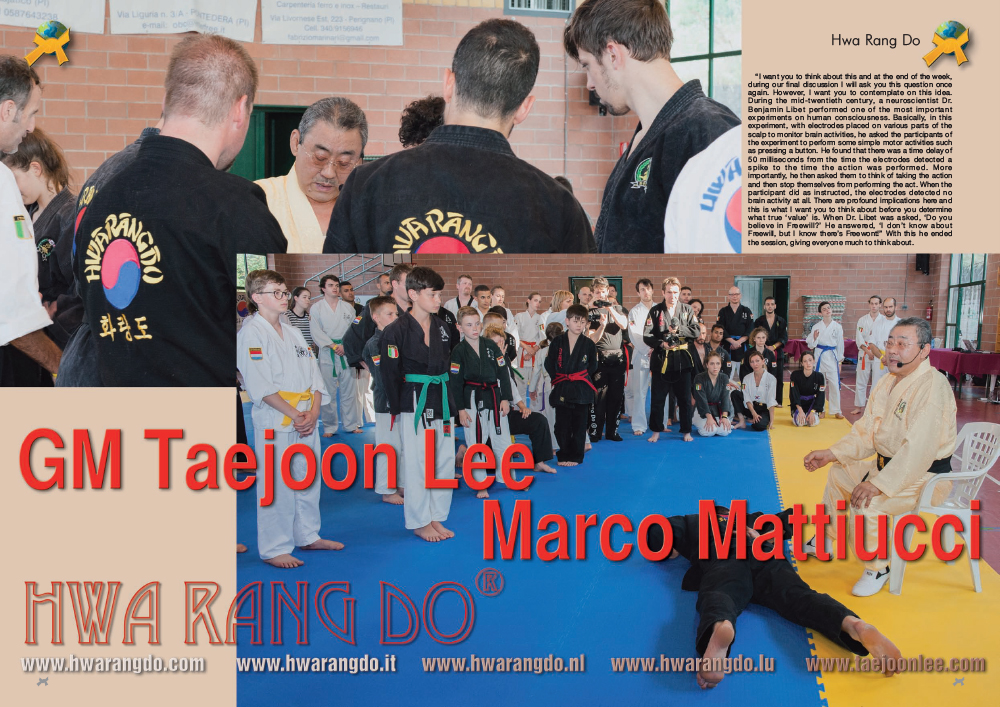
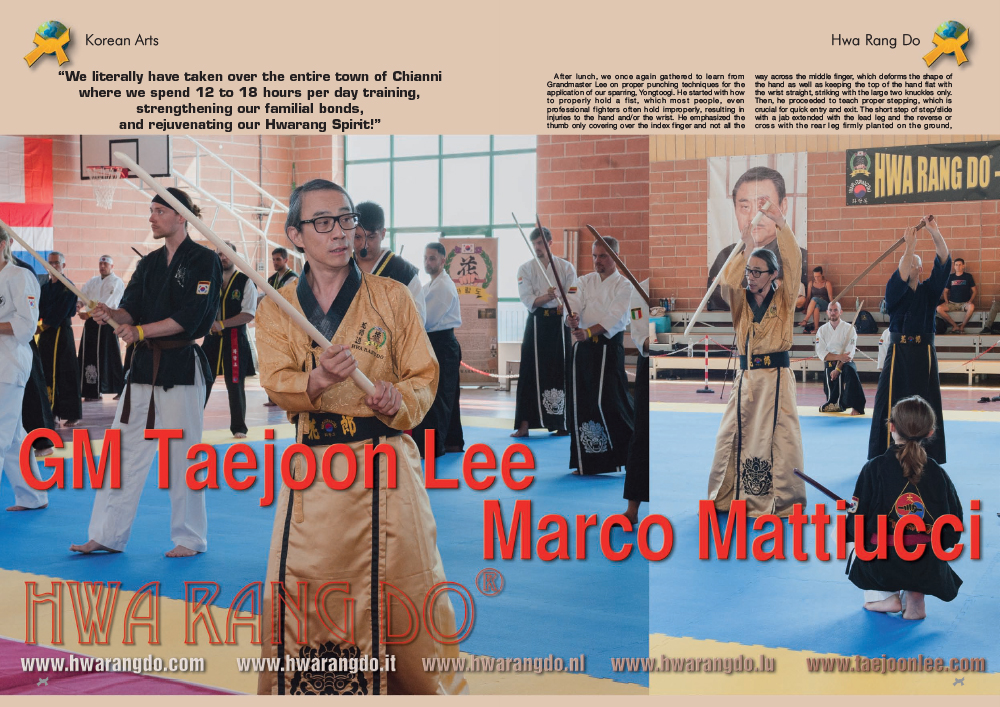
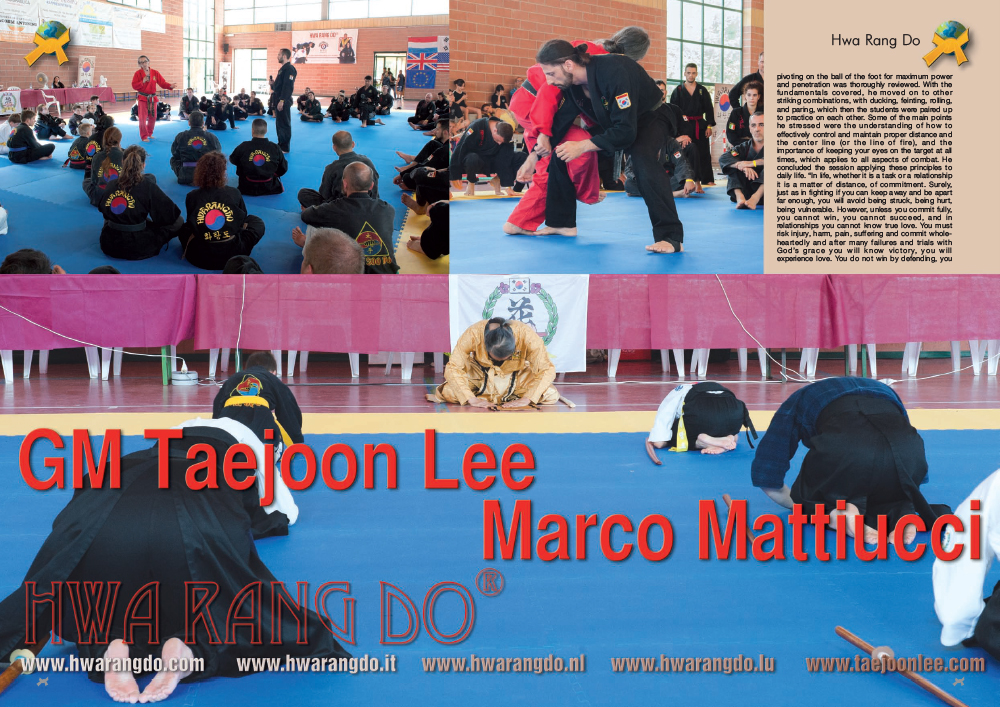
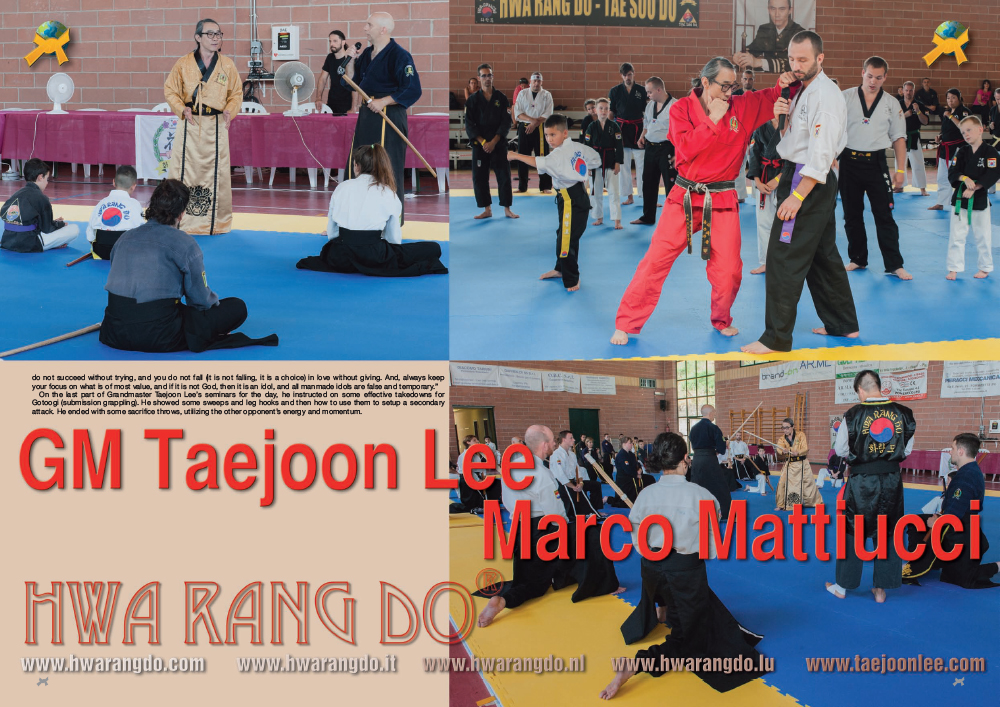
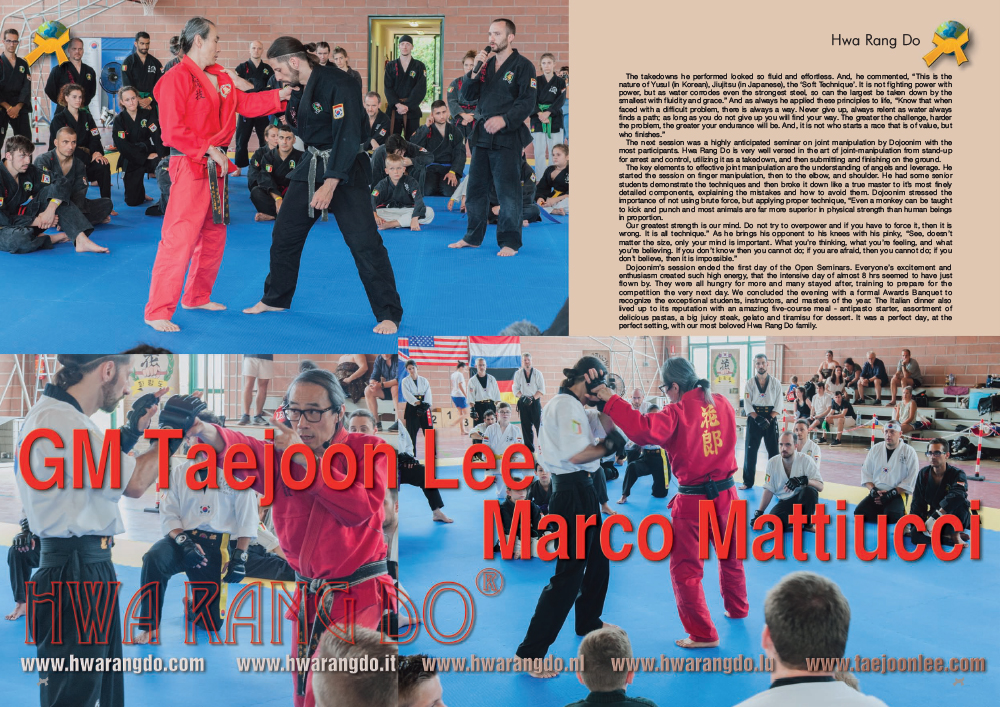
PDF: budo-2019-10oct1-whrda-annualevent2019p1

